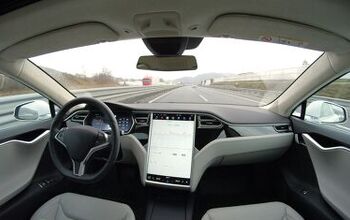Japan Launches Assault On Battery Problems

The trouble with EVs is that they need batteries. Batteries are expensive and heavy, they deplete quickly and are prone to early death. Japanese carmakers and universities are assaulting the problems head-on. They have batteries that go twice as far and live twice as long. But there is a new problem …
Toyota, in cooperation with the Tokyo Institute of Technology and the High Energy Accelerator Research Organization, developed a prototype battery that can be processed into sheet form. It makes for a lower cost battery that can store several times the amount of electricity in the same volume. Once in production, range of an EV using that battery doubles, says The Nikkei [sub]
Mazda and Hiroshima University developed a new electrode material based on molecular spheres of carbon. A battery using this material will either be half the weight, or “will make it possible to at least double an EV’s continuous driving distance,” says The Nikkei.
NEC has done something that prevent early aging of batteries. NEC came up with an electrolyte that allows 20,000 recharge cycles instead a few thousand cycles currently. This battery could last a lifetime of a car instead of giving up the ghost after currently seven or eight years.
The only problem: All these technologies exist in the lab only, and will not be available until at least five years from now.

Bertel Schmitt comes back to journalism after taking a 35 year break in advertising and marketing. He ran and owned advertising agencies in Duesseldorf, Germany, and New York City. Volkswagen A.G. was Bertel's most important corporate account. Schmitt's advertising and marketing career touched many corners of the industry with a special focus on automotive products and services. Since 2004, he lives in Japan and China with his wife <a href="http://www.tomokoandbertel.com"> Tomoko </a>. Bertel Schmitt is a founding board member of the <a href="http://www.offshoresuperseries.com"> Offshore Super Series </a>, an American offshore powerboat racing organization. He is co-owner of the racing team Typhoon.
More by Bertel Schmitt


































Comments
Join the conversation
Good points all. I fully support the concept of electric cars. The problem is that the infrastructure is not there, and the planning for such things takes foresight, technical competence, and a bit of leadership. We have little - if any - on either side of the political spectrum. With respect to NASA (back when it was run by engineers, not managers), they oversaw a massive infrastructure effort needed to support the myriad development efforts required for the Apollo missions. In my humble opinions, this was because the politicians allowed the scientists/engineers to do what they knew needed to be done. The fact is, no one really knows what the next big thing in energy/transportation will be. I'd like to think it's electric...but as I stated earlier, if it is...we ain't prepared for it. Period.
Remarkably, the following is not uncommon where I live (admittedly the place which has the highest percentage voting democratic of any city, state, or county) in every election): Q: Why are you installing a solar system when your house is so efficient? A: I'm planning to eventually charge my electric car from the system. Batteries are the next big thing, and not just for cars. If you can bank your solar power and ditch the grid for your home, what red-blooded American would not take the opportunity to say F.U. to their power company, even at a modest increase in cost? The freedom from not being dependent on others is priceless.
All this sounds like great news, and I look forward to the new tech being successful. I also would like to see super-capacitors used in hybrids (where the purpose is to briefly store braking energy, not extended distance propulsion).
I'm not interested in funding any efforts, thank you. Let's use the method used by England in the 18th century to get a reliable chronometer. Its the same approach used more recently for the X Prize goals or for the Clay Institute's awards for solving difficult math problems, like proving the Navier-Stokes Equations in 3D. Funding 'efforts' gets us crap like Solyndra (and the others we haven't heard about yet). Lets rewards results instead of corrupt crony capitalism or venture socialism. IIRC, the prize for the chronometer was on the order of $100 million in today's money. I think you might need even larger for battery development - but possibly still less than the $500 million pissed away on Solyndra.